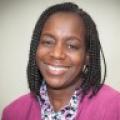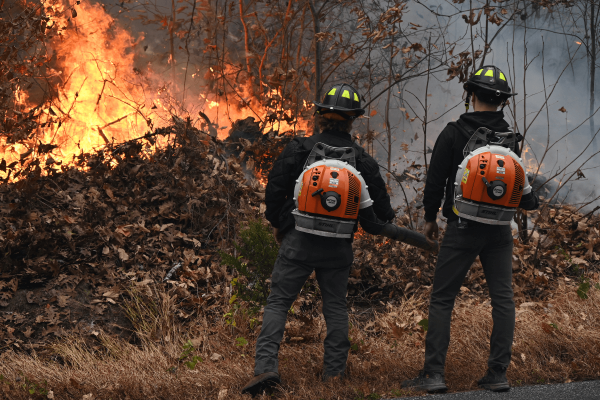Twenty years ago, men gathered as “Promise Keepers” and filled the National Mall for a prayer rally seeking repentance and spiritual revival.
On Oct. 9, it was the women’s turn.
A largely female audience of thousands gathered on the lawn in the shadow of the U.S. Capitol for the “Rise Up” prayer rally. Braving wind and rain, these Christian women — many charismatic or Pentecostal — declared their unity and sought God’s guidance to lead the nation.
At turns on their knees, huddled in small groups, and facing a stage with hands raised, those gathered prayed for reconciliation between men and women, between racial and ethnic groups, and for ending abortion. In marked contrast to the Women’s March right after President Trump’s inauguration, these women had a different agenda.
“Know this: You have made history and you’re going to begin to see it unfold in the changes in government,” said Cindy Jacobs of the ministry Generals International as the gathering concluded. “You’re going to be able to see it unfold in the people that are saved.”
She told them that God will note what they accomplished on a humid and rainy day: “We’re going to make a decree right now on the count of three: a new Jesus People movement.”
Many wore yellow or transparent ponchos that had protected them from earlier rains. Others sat in chairs, held strollers with young children or the hand of the spouse who came with them.
Organizers, who did not give an estimate of the crowd size, had billed the event as a chance for “Esthers and Deborahs” — biblical women who are held up as courageous heroes — to congregate publicly and seek divine help to heal the nation. Some of the speakers, including Jacobs and Alveda King, an anti-abortion activist and niece of the Rev. Martin Luther King Jr., likened themselves to one of those two biblical heroes in videos summoning women to attend.
Baltimore resident Sandy Weiss, who wore a bright yellow T-shirt that declared “Jesus is my savior – not my religion,” said she followed the model of Esther and fasted and prayed for three days before she came to the Mall event.
“We’re looking for a spiritual revival of the world,” she said, adding that she’s praying for Trump. “He’s been personally anointed. He believes. He is a follower of the Lord.”
Speakers also talked about praying for Trump, and for President Obama before him, but another branch of government came under a pointed focus for prayer: the Supreme Court. At one point Jacobs and Lou Engle, founder of The Call movement that sponsored the rally, took turns facing in the direction of the high court and prayed for the overturning of Roe v. Wade, the 1973 decision that legalized abortion.
“We believe that we are in a moment when the judges of America can be shifted,” said Engle, after the assembled masses pasted their mouths with red “LIFE” stickers. “God gave us this dream that we are to pray for the reform or the resigning of judges.”
The crowd also prayed for millions more to adopt children — a response to critics of the anti-abortion movement.
Speakers took turns repenting for sins they said had been committed by others. Raleigh Washington, president of Promise Keepers, sought forgiveness from women who felt abused by men. Alveda King declared forgiveness for those repenting for racism.
Strangers gathered in circles, sometimes placing hands on the head of someone next to them or wrapping arms around one another as they prayed fervently. Sometimes they shouted. Sometimes they wept.
Rise Up followed the three-day “Awaken the Dawn,” an event that featured 50 tents along the expanse between the Capitol and the Washington Monument, with each one representing a different state.
For 72 hours, people prayed inside and outside of each tent, sometimes with a dozen or more others. Some women at Rise Up described spending hours with people from their state in designated tents.
When hundreds of thousands of men gathered on Oct. 4, 1997, some kneeled and others studied their Bibles. While that group was criticized for allegedly seeking to subjugate women, Monday’s event put women in prominent roles, leading most of the prayers and the worship songs.
Holly Pivec, an evangelical author of books on new Christian movements, said that while the Promise Keepers and some of their supporters questioned whether women should be in leadership roles, the leaders of the gathering on Monday had moved beyond those concerns.
“Many of them believe that women should be pastors and leaders in their churches and that they’ve been held back from those roles in more traditional churches,” she said in an interview before the event.
But some speakers spoke of being there more for unity than for feminism — criticizing the earlier Women’s March that took place at the same location.
Pivec is a blogger and critic of the New Apostolic Reformation, a series of networks that includes 3 million Americans in Pentecostal and charismatic churches.
She said the Rise Up event included some leaders of the movement, which focuses on a larger goal of sociopolitical transformation in addition to saving souls.
One woman from Alabama who attended with her husband and their four children said they were affiliated with NAR, while others called themselves “believers” or “Jesus followers.”
Engle’s ministry first gathered worshippers — tens of thousands of mostly charismatic Christian teens and adults — to the Mall in 2000 for 12 hours of prayer, preaching, and music. It rained that day too, and most of the crowd stayed put.
Since that time, Engle has held “solemn assemblies” across the nation, in fields and stadiums.
Angie Aparicio, a Pentecostal from Santa Ana, Calif., said she felt her faith was affirmed by the latest rally.
“I feel more powerful by the Holy Spirit, with more vision, more motivated and free,” she said.
Got something to say about what you're reading? We value your feedback!







